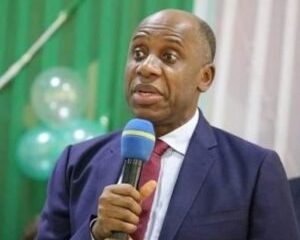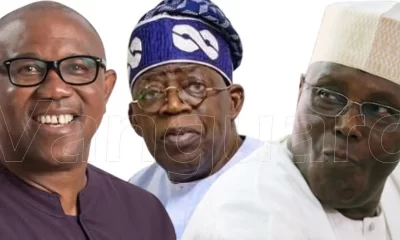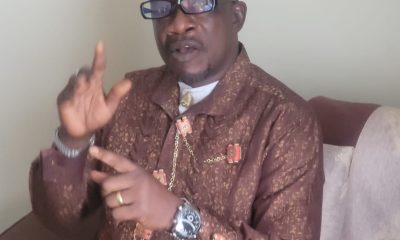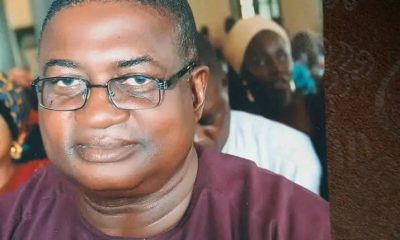Business News
Chinese Loans: ‘Sovereignty Clause’, Contract Term to Ensure Payback -Amaechi
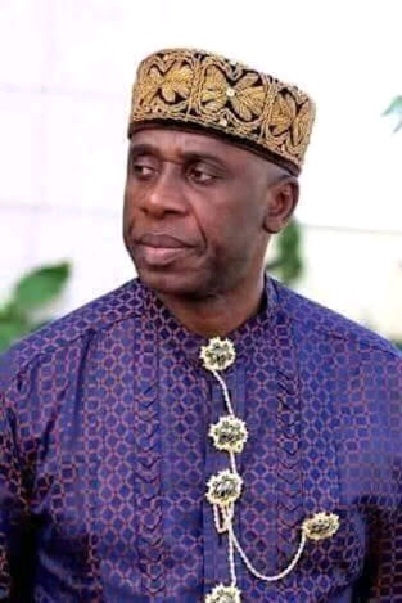
By Mathew Dadiya, Abuja
Following reactions by Nigerians on the allegations that the country may forfeit her sovereignty to China over the railways projects loans, the Minister of Transportation, Mr Rotimi Amaechi has explained that the clause ‘waiving sovereignty’ in the loan agreement between Nigeria and China “is only a contract term.
”The Minister made the clarification at the weekend while responding to questions about the loan controversy on a TV programme.
Amaechi said that the “the sovereign guarantee assures payback according to the terms and conditions of any loan.”
He added that the Ministry of Transportation was not responsible for taking loans, but to implement the projects or contracts for which the loans were taken.
“It is a commercial agreement, it’s a trade agreement between Nigeria and China. The first issue is that Ministry of Transport does not take loan. Anything about loan, talk to Ministry of Finance. What I signed is what they call commercial contract, that is contract between the federal government and CCECC as a contractor.
“The contract between Nigeria and China is usually signed by the ministry of finance on behalf of Nigeria, but that will be escaping the issue. Whether it is the Ministry of finance that signed it or the Ministry of Transport, the issues are the issues.
“There is no contract without an agreement and that agreement must contain some terms and one of the terms that this one contains, is not that you’re signing away the sovereignty of the country.
“No country will sign away its sovereignty. What you do is, you give a sovereign guarantee; and I’m ashamed of those who interpret it the wrong way.
“Now, when you say ‘I give you a sovereign guarantee and I waive that immunity clause, the immunity clause is that, if tomorrow I’m not able to pay you and you come to collect the items that we’ve agreed upon, that these are items I have put down as guarantee, I can use my immunity and say no, you cannot touch our assets, we are a sovereign country. Is China our father that will give us money for free? They (the Chinese) are saying, if you are not able to pay, don’t stop us from taking back those items that will help us recover our funds.
“And it’s a standard clause, whether it’s with America you signed it or with Britain or any country, because they want to know they can recover their money.
“What the clause does is to say to you, I expect you to pay according to those terms and conditions. If you don’t pay, don’t throw your immunity on me (the lender) when I come to collect back the guarantee you put forward, that’s all.
“The waiving of immunity simply means in trade parlance that I’m not giving you this loan free. Just like if you go to take a loan from the bank, the moment you don’t pay, they go after the assets you put down. And people are politicising it. The Chinese can never come and take over Aso rock and become President or Minister.
Allaying the fear of some Nigerians asking if it’s possible to repay the loan and not get into the same situation as Zambia, Amaechi stated that the loan was already being repaid “In the same National Assembly committee sitting, they were told that out of the 500 million dollars, we’ve paid 96 million dollars already.
“Nigeria is already paying… So, it’s not that Nigeria doesn’t have the capacity to pay back. We’ll pay back. At 2.8 percent, what other country would give you that loan? 2.8 per cent for 20 years with 7 years moratorium, why can’t you pay back? The repayment plan is not done by us, it’s done by the ministry of finance, but they are meeting the requirements. At any point in time that we need to pay, we pay,” the minister explained.
He maintained that the loans were not paid to him nor the Ministry, which automatically eliminates any fear of corruption or diversion of funds – “They are paid directly to the contractor in China.”
He said: “I told them at that meeting, that these loans are not given to us, they are paid directly to the contractor. Once we sign that the job has been done, they pay the contractor. And this has never been done before. So what is critical is that the projects are being done. Or, are they trying to rubbish the fact that there is a railway from Abuja-Kaduna?
“These loans are not paid here, so you can’t even steal it. What we do is ensure that the work is done. We hired an Italian company that goes with our engineers in the ministry to ensure that the Chinese meet the European standard, so that there are no fake things or poorly done work. When they check and say yes, this has been done and done to the standard of the contract approved, then they pass it on to us, we sign and approve that the work has been done. It is then sent to the ministry of finance who also appends their signature and passes it on to the Chinese Exim bank who then pays to the contractor. “
“The job is development related. If you don’t do it, you don’t get paid. So the contractor would want to do the job, he wants to satisfy his client, so that the client can sign to say that he has done the job.”
The Transport’s Ministers reiterated his call to the National Assembly to put a hold on the probe as some loans were still being expected for the completion of Lagos to Ibadan and the construction of Ibadan to Kano and Port Harcourt to Maiduguri rail.”
“There is an agreement for Abuja to Kaduna which was signed before we came, we signed the Lagos to Ibadan, we want to sign the Ibadan to Kano. Now we’ve also applied for them to give us a loan for Port Harcourt to Maiduguri which entails that when the loan is approved, we’ll construct the rail from Port Harcourt to Aba to Owerri to Umuahia to Enugu to Makurdi to Lafia to Jos to Bauchi to Gombe and then to Damaturu. Everybody is shouting that there is no railway in the South East. But there is railway in the South South.,” he said, noting that the Itakpe to Warri which was abandoned for 34 years was completed without taking a loan. He stressed that both the National Assembly and the country should at least appreciate that the government was making progress in terms of infrastructure development.
“So what should be primary to them is national interest, because we need to construct Lagos to Ibadan to be able to evacuate cargoes that come from Lagos to the hinterlands. So what they are doing now, may likely stop that. The same way, the government is under pressure to construct Port Harcourt to Maiduguri which passes through the south Eastern States and the North Eastern states.
“If we go now and the Chinese say ‘we won’t give you the money because the arm of government that is supposed to approve this loan, which they have already approved are beginning to question the loan they have approved, we are not sure that we can recover the loan,’ then we can’t finish our projects,” Amaechi said.
He argued that all loan applications pass through the National Assembly for approval and wondered why they were investigating what they approved.
The minister said he would had loved to publish those clauses if not for the issue of confidentiality in government, stating that the National Assembly knows about the clauses because “it is unconstitutional to take a loan that is not approved by the national assembly.”
He explained further that the lawmakers were aware of all those loans, asking why they were investigating same.
He said, “The Chinese is just asking us to show them the evidence that we will pay back which is the immunity clause, if we don’t pay, they can take back their assets and don’t forget that we can’t take loan without the National Assembly approval.
“There is no loan in Nigeria either internal or external that is not approved by the National Assembly , none. Chinese government will not even give you a loan without approval by the National Assembly because if they give you a loan without the approval from NASS, that is no loan.”
Business News
Tinubu Congratulates Dangote on World Bank Appointment

By Jennifer Enuma, Abuja
President Bola Tinubu has congratulated Alhaji Aliko Dangote, the President of Dangote Group, on his appointment to the World Bank’s Private Sector Investment Lab, a body tasked with promoting investment and job creation in emerging economies.
In a statement by Special Adviser on Media and Publicity, Bayo Onanauga, the President described the appointment as apt, given Dangote’s rich private sector experience, strategic investments, and many employment opportunities created through his Dangote Group.
The Dangote Group became one of Africa’s leading conglomerates through innovation and continuous investment.
Dangote Group’s business interests span cement, fertiliser, salt, sugar, oil, and gas. However, the $20 billion Dangote Petroleum Refinery and Petrochemicals remains Africa’s most daring project and most significant single private investment.
“President Tinubu urges Dangote to bring to bear on the World Bank appointment his transformative ideas and initiatives to impact the emerging markets across the world fully” the statement said.

The World Bank announced Dangote’s appointment on Wednesday, as part of a broader expansion of its Private Sector Investment Lab. The lab now enters a new phase aimed at scaling up solutions to attract private capital and create jobs in the developing world.
The CEO of Bayer AG, Bill Anderson, the Chair of Bharti Enterprises, Sunil Bharti Mittal, and the President and CEO of Hyatt Hotels Corporation, Mark Hoplamazian, are on the Private Sector Investment Lab with Dangote.
The World Bank said the expanded membership brings together business leaders with proven track records in generating employment in developing economies, supporting the Bank’s focus on job creation as a central pillar of global development.
Business Analysis
Nigeria Customs Generates over N1.75trn Revenue in 2025
By Joel Oladele, Abuja
The Nigeria Customs Service (NSC) has generated an impressive N1,751,502,252,298.05 in revenue during the first quarter of 2025.
The Comptroller-General (CG) of the Service, Bashir Adeniyi, disclosed this yesterday, during a press briefing in Abuja.
According to Adeniyi, the achievement not only surpasses the quarterly target but also marks a substantial increase compared to the same period last year, reflecting the effectiveness of recent reforms and the dedication of customs officers across the nation.
“This first quarter of 2025 has seen our officers working tirelessly at borders and ports across the nation.
I’m proud to report we’ve made real progress on multiple fronts—from increasing revenue collections to intercepting dangerous shipments,” Adeniyi stated.He attributed this success to the reforms initiated under President Bola Tinubu’s administration and the guidance of the Honourable Minister of Finance and Coordinating Minister of the Economy, Olawale Edun.
The CG noted that the revenue collection for Q1 2025 exceeded the quarterly benchmark of N1,645,000,000,000.00 by N106.5 billion, achieving 106.47% of the target. This performance represents a remarkable 29.96% increase compared to the N1,347,705,251,658.31 collected in Q1 2024.
Adeniyi highlighted the month-by-month growth, noting that January’s collection of N647,880,245,243.67 surpassed its target by 18.12%, while February and March also showed positive trends.
“I’m pleased to report the Service’s revenue collection for Q1 2025 totaled N1,751,502,252,298.05.
“Against our annual target of N6,580,000,000,000.00, the first quarter’s proportional benchmark stood at N1,645,000,000,000.00. I’m proud to announce we’ve exceeded this target by N106.5 billion, achieving 106.47% of our quarterly projection. This outstanding performance represents a substantial 29.96% increase compared to the same period in 2024, where we collected N1,347,705,251,658.31.
“Our month-by-month analysis reveals even more encouraging details of this growth trajectory,” Adeniyi said.
In addition to revenue collection, Adeniyi said the NCS maintained robust anti-smuggling operations, recording 298 seizures with a total Duty Paid Value (DPV) of ₦7,698,557,347.67.
He stated that rice was the most seized commodity, with 135,474 bags intercepted, followed by petroleum products and narcotics.
“From rice to wildlife, these seizures show our targeted approach,” Adeniyi remarked, noting the NCS’s commitment to combating smuggling and protecting national revenue.
Adeniyi also highlighted key initiatives, including the expansion of the B’Odogwu customs clearance platform and the launch of the Authorized Economic Operators Programme, which aims to streamline processes for compliant businesses. The NCS’s Corporate Social Responsibility Programme, “Customs Cares,” was also launched, focusing on education, health, and environmental sustainability.
Despite these achievements, the CG noted that the NCS faced challenges, including exchange rate volatility and non-compliance issues. Adeniyi acknowledged the need for ongoing adaptation and collaboration with stakeholders to address these challenges effectively.
Looking ahead, the NCS aims to continue its modernization efforts and enhance service delivery, ensuring that it remains a critical institution in Nigeria’s economic and security landscape.
“Results speak louder than plans; faster clearances through B’Odogwu, trusted traders in the AEO program, and measurable food price relief from our exemptions. We’ll keep scaling what works,” he concluded.
BUSINESS
NSIA Net Assets Hit N4.35trn in 2024
By Tony Obiechina Abuja
The Nigeria Sovereign Investment Authority (NSIA) yesterday disclosed that its net assets grew from N156bn in 2013 to N4.35 trillion in 2024.
Similarly, the Authority has remained profitable for 12 consecutive years, leading to cumulative retained earnings of N3.
74 trillion in 2024.Managing Director and Chief Executive Officer of NSIA, Aminu Umar- Sadiq made these disclosures at a media engagement in Abuja, highlighting its audited financial results for the 2024 fiscal year.
According to him, the results underscored the resilience of the authority’s investment strategy and the strength of its earnings, driven by a well-diversified revenue base and robust risk management practices, despite a challenging global macroeconomic and geopolitical environment.
Total operating profits, excluding share of profits from associates and Joint Venture (JV) entities, increased from N1.17 trillion in 2023 to N1.86 trillion in 2024, driven by the strong performance of
NSIA’s diversified investment portfolio, infrastructure assets, gains from foreign exchange movements, and derivative valuations.
In addition, Total Comprehensive Income (TCI), inclusive of share of profits from associates and JV entities, reached N1.89 trillion in 2024, reflecting a 59 per cent increase from N1.18 trillion in 2023.
Core TCI (excluding foreign exchange and derivative valuation gains) rose by 148 per cent to N407.9 billion in 2024 compared to N164.7 billion in 2023, supported by robust returns on financial assets measured at fair value through profit and loss, including collateralised securities, private equity, hedge funds, and Exchange-Traded Funds (ETFs).
Umar-Sadiq said the authority’s outstanding financial performance in 2024 reflected the “strength of our strategic vision, disciplined execution and unwavering commitment to sustainable socio-economic advancement.”
He said, “By leveraging innovation, strategic partnerships and sound risk management, we have not only delivered strong returns but also created value for our stakeholders
“As we move forward, we remain focused on driving economic transformation, expanding opportunities, scaling transformative impact and ensuring long-term prosperity for current and future generations of Nigerians.”
The CEO reaffirmed the authority’s commitment to managing the country’s SWF, and delivering the mandates enshrined in the NSIA Act.
He said NSIA remained poised to continually create long-term value for its stakeholders by delivering excellent risk-adjusted financial results, developing a healthy and well-diversified portfolio of assets and large-scale infrastructure projects, and enhancing the desired social outcomes.
He noted that NSIA was committed to its mandate of prudent management and investment of Nigeria’s sovereign wealth.
“In adherence to its Establishment Act, NSIA prioritises transparency, disclosure, and effective communication with all stakeholders and counterparties,” he said.
He pointed out that in the year under review, a new board, led by Olusegun Ogunsanya as Chairman, was appointed by President Bola Tinubu, in accordance with the provisions of the NSIA Act.
The new board will provide strategic direction and oversight, in addition to playing a pivotal role in critical decision making.
He remarked that under the guidance of the Board, the Authority will retain focus on its primary mandate of creating shared value for all stakeholders based on its continued adoption of corporate governance practices.
“NSIA prides itself an investment institution of the federation established to manage funds in excess of budgeted oil revenues and its mission is to play a pivotal role in driving sustained economic development for the benefit of all Nigerians through building a savings base for the Nigerian people, enhancing the development of the county’s infrastructure, and providing stabilisation support in times of economic misadventure,” he added.



